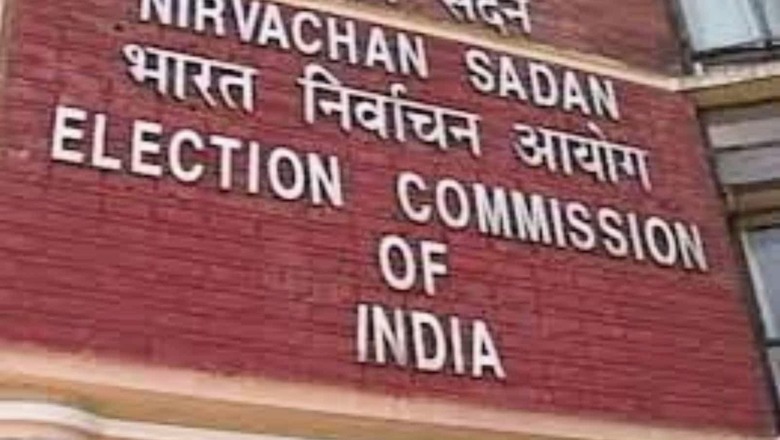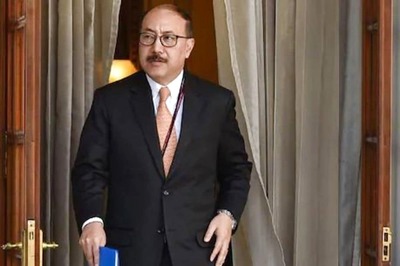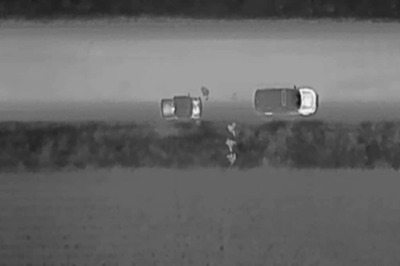
views
The Supreme Court on Thursday questioned the process adopted for appointing Arun Goel as an Election Commissioner (EC), and said his file got clearances in “haste” and with “tearing hurry”.
As the apex court observed that the file pertaining to Goel’s appointment was cleared with “lightning speed”, the Centre through Attorney General R Venkataramani asked the court to “hold its mouth” and requested it to look into the matter in its entirety. “What kind of evaluation is this? Although, we are not questioning the merits of Arun Goel’s credentials but the process,” a five-judge Constitution bench headed by Justice K M Joseph said.
The top-most law officer told the bench, which was making a volley a comments on the issue, “Please hold your mouth for a while. I request to look into the issue in entirety”. It perused the original file of Goel’s appointment as an EC, which was placed before the bench by the Centre in pursuance of Wednesday’s direction given by the top court.
The bench is hearing a batch of pleas seeking a collegium-like system for the appointment of ECs and the Chief Election Commissioner.
The Supreme Court on Tuesday had said the CEC heads an institution, though with his truncated tenure, he cannot do anything substantial and added that “silences of the Constitution” is being exploited by all as it expressed concern at the absence of a law governing the appointments of CECs and Election Commissioners (ECs).
A five-judge Constitution bench, headed by Justice K.M. Joseph had pointed out that since 2004, no Chief Election Commissioner has completed the six-year tenure. During the UPA government there were six CECs and between 2015-2022, in eight years of the NDA government, there have been eight CECs, it said.
The bench – also comprising Justices Ajay Rastogi, Aniruddha Bose, Hrishikesh Roy, and C.T. Ravikumar — said even though the CEC heads an institution, with his truncated tenure, he cannot do anything substantial and said this is a disturbing trend. “There are no checks and balances in the Constitution. This is how the silence of the Constitution is being exploited by all….. There is no law and legally, they are correct. Nothing could be done in the absence of a law,” he said.
What Does Article 324 of Constitution Say?
The bench flagged Article 324 of the Constitution, which talks about the appointment of Election Commissioners. It said the article does not provide the procedure for such appointments, though it had envisaged the enactment of a law by Parliament, however it has not been done in the last 72 years, leading to ‘exploitation by the Central government’.
Article 324 of the Indian Constitution empowers the Election Commission to direct, control, and conduct elections to all legislatures in India, as well as elections to the offices of President and Vice President established by the Constitution. Article 324 vests the “superintendence, direction and control of elections” in an Election Commission consisting “of the Chief Election Commissioner and such number of other Election Commissioners, if any, as the President may from time to time fix”.
“You look at the position of CEC and ECs. The word ‘superintendence’ connotes reservoir of power, authority and duties that have been put on fragile shoulders of three men… What’s important is to put a system in place. In any given number of situations, the character of a man is of utmost importance — ‘I won’t allow anybody to bulldoze me. Whether it’s the Prime Minister or anybody else, I don’t care about it.’ We want someone like him. So, how do we get the man appointed? That’s why the process of appointment becomes crucial,” the bench stated during the Tuesday hearing.
ECI currently has three members: a CEC and two ECs. The President has the authority to appoint the CEC and ECs under Article 324(2) of the Constitution. This provision also states that the President will make appointments “subject to the provisions of any law made in that behalf by Parliament” with the assistance and advice of the Prime Minister and the Council of Ministers, according to a report by Hindustan Times.
However, because no such law has been enacted to date, CECs and ECs are appointed by the Prime Minister and the Council of Ministers under the President’s seal. The rules for such appointments are also silent on a candidate’s qualifications, the HT report states.
A group of four public interest litigations (PILs) have urged the Centre to establish a neutral and independent selection panel to recommend names to the President for appointments as CECs and ECs.
Criticizing the government for failing to pass legislation despite a positive mandate under Article 342(2), the petitioners proposed last week that the Supreme Court form a selection panel akin to the Central Bureau of Investigation (CBI), with the Prime Minister, the Chief Justice of India, and the leader of the single largest opposition party.
(The positive aspect of Constitutionalism necessitates viewing the state as a “Welfare State.” To ensure the well-being of its citizens, the positive version of constitutionalism requires the establishment of effective and competent state institutions.)
What Article 324 Says on Independence of EC
Article 324 of the Constitution makes the following provisions to safeguard and ensure the Election Commission’s independence and impartiality:
- Security of tenure: He cannot be removed from office except in the same manner and on the same grounds as a Supreme Court judge.
- After his appointment, the chief election commissioner’s service conditions cannot be changed to his disadvantage.
- Any other election commissioner or regional commissioner cannot be removed from office unless the chief election commissioner recommends it.
- The Election Commission has complete authority over how, where, and when an election is held, regardless of whether it is a general election or a by-election.
1991 Election Commission Act & What SC Says
CECs and ECs are appointed for a six-year term or until they reach the age of 65, whichever comes first, under the Election Commission (Conditions of Service of Election Commissioners and Transaction of Business) Act of 1991. The SC bench mentioned the presence of the CJI on the selection panel for the CBI director at one point during the day-long hearing on Tuesday. “The mere presence of CJI sends the message that you can’t play games,” it said.
The bench told Attorney General R. Venkataramani, representing the Centre, that as per law, the CEC has a fixed a tenure of six years or up to the age of 65 years, whichever is earlier and the government knows about their date of birth, as most of them were former bureaucrats. It added that the government ensures that the one who is appointed does not get his full 6 years and the independence gets thwarted here.
The bench told the AG that CECs are not getting their full terms and asked, how will they carry out their tasks? Venkataramani replied that the present process, where the President appoints the CECs and ECs cannot be said to be unconstitutional and the court cannot strike it down.
Citing the truncated tenure of the CECs and ECs, the bench added that it is not concerned with this or that political party but this percolates down to the fundamental right of the individual. The bench asked Venkataramani to inform it by Wednesday about the government’s method, if there is one, for the appointment of ECs and CECs.
With inputs from agencies
Read all the Latest Explainers here




















Comments
0 comment